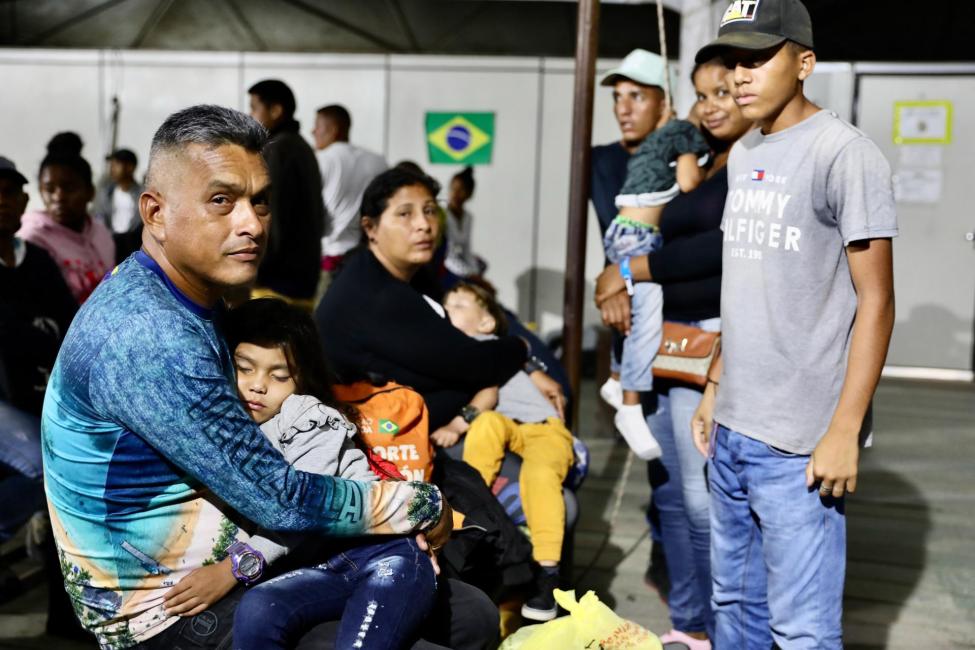-
Who we are
WHO WE AREFollowing the UN Secretary-General's request to IOM and UNHCR to co-lead the regional inter-agency response, the Office of the Director General’s Special Envoy for the Regional Response to the Venezuela Situation (OSE) was established in 2019 to coordinate IOM's assistance for migrants and refugees from Venezuela.
SOBRE NOSOTROS
SOBRE NOSOTROS
OIM Global
OIM Global
-
Our Work
What we doThe Office of IOM´s Special Envoy for Migrants and Refugees from Venezuela is responsible for the coordination and oversight of regional projects within the framework of Venezuela's Migrant and Refugee Response Plan (RMRP) in South America, North America, Central America and the Caribbean, working closely with implementing missions and Regional Offices.
PRIORIDADES TRANSVERSALES
- Where we work
- Data and Resources
- Take Action
- 2030 Agenda
Boa Vista, 25 April 2023 – As he packed his belongings into a suitcase hours before departing for a new life in Santa Catarina, a state in southern Brazil, Javier said he felt like he was being torn in two. “I’m leaving because of my son and grandchildren for their future. I hope they can get a good education and have a better life than the one that I have lived,” the 46-year-old Venezuelan said.
Together with his son Jose, 21, his daughter-in-law Deikerson, 20, and his three grandchildren, the former car mechanic from Ciudad Bolivar, Venezuela, has lived in a humble house, paying USD 100 in rent in Boa Vista, Brazil, since 2019. Since then, the family has survived by receiving humanitarian assistance and collecting recyclable plastic bottles.
Thanks to a Brazilian government-led relocation strategy, Javier is starting a new job in Santa Catarina. Within 24 hours, he is travelling 5,000 kilometers south of Boa Vista to his new home where he hopes to bring his family whom he is leaving behind.
Sitting together on a bed on the porch outside the house to escape from the intense heat, Javier and his son exchange a few words as they count down the hours until saying their goodbyes.
“The hardest part is that I am leaving my son and daughter-in-law behind, especially my grandchildren,” he said, bowing to hide his tears. “But on the other hand, I feel happy because I can put my skills to work in a decent job, with a fixed salary at the end of the month, for the first time in my life.”
By flying thousands of Venezuelans out of remote Roraima to cities with better job prospects, the ‘interiorization’ strategy, which operates with the support of the International Organization for Migration (IOM) and other UN agencies, helps refugees and migrants from Venezuela get a fresh start in Brazil.
This voluntary relocation programme, part of Operation Welcome, the humanitarian response of the Brazilian government, offers a lifeline and fosters integration by helping people find new job opportunities or reunite with family or friends in other parts of the country. More than 100,000 people have been relocated to over 930 cities in the last five years throughout the continent-sized country.
Pedro, 26, and Loriuska, 19, are a young Venezuelan couple starting a new life together in southern Brazil, with job opportunities on the horizon.
“This is like a rebirth for us, as we will no longer be on the streets, we will have a place to sleep, a bathroom, and earn money to send back to our families in Venezuela,” Pedro said.
“I feel happy because we are moving towards a new future,” Loriuska said before boarding a six-hour flight to Curitiba, in the state of Parana. “The thing I most want to do now is study. I want to make up for all the time I have lost.”
People are relocated to join family members or friends already living in other parts of Brazil, others are recruited before leaving Boa Vista by companies in need of labour and others are supported by civil society organizations.
And they are not alone in pursuing what they call “The Brazilian Dream.” Since April 2018, the Brazilian government has transferred thousands of Venezuelans from strained border areas in the north to other cities, such as Rio de Janeiro and Brasilia, offering better opportunities to achieve autonomy and integration. With the help of IOM staff, migrants and refugees find housing and work options.
Santo, 58, and Mireya, 51, arrived one month ago in Brazil, to reunite with their only son and grandchildren, who have been living in Santa Catalina since 2021. They both miss their home country but are grateful that other countries in the region, like Brazil, are hosting Venezuelans. “Brazil is giving us a new opportunity and we hope to repay everything we have received,” Santo said, sitting on a bunk bed in one of the federal shelters in Boa Vista.
Their journey started in Temblador, a small rural community in Monagas state, Venezuela. They said goodbye to relatives and friends, sold their lifelong home for USD 300 and set off for the Brazilian border. Since then, they have lived in a temporary shelter with other hundreds of Venezuelans. “Our lives are up in the air, we have nothing,” the carpenter said, hoping that when he has a stable job, he will be able to have a new house. “I am a professional with 30 years of experience and I can make progress and work here.”
Santo and Mireya already see Brazil as their second home, “It is great to see that we can be part of the future of the country and they accept us,” Santo said, radiating happiness as they boarded a flight to Santa Catarina, to soon be reunited with their son and grandchildren.
This story was written by Gema Cortés, IOM Media and Communications Unit, Office of the Special Envoy for the Regional Response to the Venezuelan Situation.
















